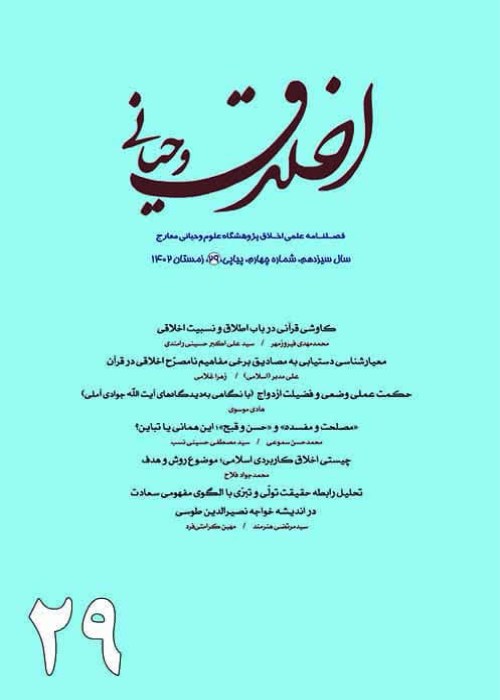The Firmness and Productivity Tradition: an Ethical Rule in Islam
Author(s):
Article Type:
Research/Original Article (دارای رتبه معتبر)
Abstract:
The subject matter of this paper is the tradition of firmness as a moral principle in Islam. What is the relationship between this concept and the modern concept of productivity and what are its implications? Shia and Sunni authoritative historical and Hadith sources agree that the tradition of strength and firmness is rooted in the teachings of the Prophet (PBUH) and his household (PBUT). These teachings have been repeatedly mentioned in Islamic traditions with titles like "strength, solidity, stableness and good-doing". An analysis of these concepts suggests that they have semantic affinity with "productivity," because productivity is defined as the outcome of "efficiency and effectiveness." Effectiveness means to do good things, and efficiency means to do good things well. These elements can be fully understood in the meanings of the above titles. In addition, the concept of durability and stability of the action is also the third element in the definition of productivity, which is again included in the implications of aforementioned titles; an element which in its place is one of the educational traditions of the Prophet (PBUH). In these Hadiths, i.e. Hadiths about business and beneficial human experiences, there are issues that can be considered as areas and complementary elements of productivity and firmness. These elements include: restoring and institutionalizing the productivity tradition; changing attitudes toward the sacred position of work and income in Islam; prudence and foresight in livelihood; Taking advantage of one’s own experience and others’; consulting, specialization, practical abilities. The important result of the discussion of firmness and its relationship with productivity is that the firmness and strength of practice is one of the important teachings of applied ethics in Islam, and, according to Islamic sources, it should be accepted and studied as an inclusive culture and tradition.
Keywords:
Language:
Persian
Published:
Revelatory ethics, Volume:7 Issue: 2, 2018
Pages:
109 to 132
magiran.com/p1886675
دانلود و مطالعه متن این مقاله با یکی از روشهای زیر امکان پذیر است:
اشتراک شخصی
با عضویت و پرداخت آنلاین حق اشتراک یکساله به مبلغ 1,390,000ريال میتوانید 70 عنوان مطلب دانلود کنید!
اشتراک سازمانی
به کتابخانه دانشگاه یا محل کار خود پیشنهاد کنید تا اشتراک سازمانی این پایگاه را برای دسترسی نامحدود همه کاربران به متن مطالب تهیه نمایند!
توجه!
- حق عضویت دریافتی صرف حمایت از نشریات عضو و نگهداری، تکمیل و توسعه مگیران میشود.
- پرداخت حق اشتراک و دانلود مقالات اجازه بازنشر آن در سایر رسانههای چاپی و دیجیتال را به کاربر نمیدهد.
دسترسی سراسری کاربران دانشگاه پیام نور!
اعضای هیئت علمی و دانشجویان دانشگاه پیام نور در سراسر کشور، در صورت ثبت نام با ایمیل دانشگاهی، تا پایان فروردین ماه 1403 به مقالات سایت دسترسی خواهند داشت!
In order to view content subscription is required
Personal subscription
Subscribe magiran.com for 70 € euros via PayPal and download 70 articles during a year.
Organization subscription
Please contact us to subscribe your university or library for unlimited access!


